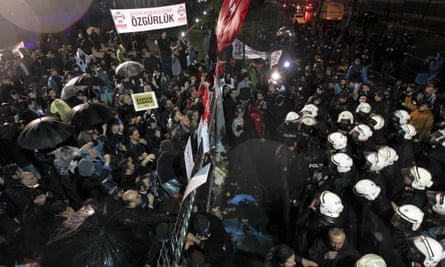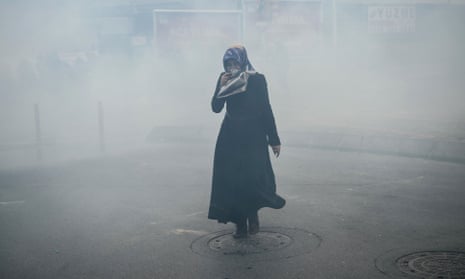Turkey is a country at the mercy of one man’s bad temper. President Recep Tayyip Erdoğan’s response to any challenge or criticism has long been combative, but it is becoming ever more excessive and vindictive. The latest victim of his anger is the country’s biggest-selling newspaper, Zaman, which was taken over by the authorities last week virtually at gunpoint.
Demonstrators trying to prevent the police entering the paper’s premises were teargassed and beaten, the editor and another senior journalist were fired by court-appointed “administrators” and, according to some of the staff, editorial files were then electronically locked and may have been wiped. Zaman got out a last defiant paper on Saturday morning deploring the takeover. Sunday’s edition, the first under the control of the administrators, was full of bland pro-government stories. It is unclear what specific offence Zaman is supposed to have committed, but it is clear why Mr Erdoğan regards it in general as objectionable. Day to day, Zaman took a moderate Islamist position not too different than that of Mr Erdoğan’s Justice and Development party (AKP), and it employed writers of varied political views, although none were favourable to the government. But it supports the influential Hizmet movement, inspired by Fethullah Gülen, an elderly cleric who lives in America.
Hizmet avoids a direct political role, preferring to operate through networks of committed members in the professions, the police and education and for years it was in a close but discreet alliance with the AKP. But the two fell out in 2013 after differences emerged over policies toward the Kurds, Israel and Iran, and over the proposed closure of schools controlled by the Gülenists. The AKP has been working to dislodge Gülenists from positions of power, and has put Mr Gülen on trial in absentia, accusing him of plotting to overthrow the government.

The Zaman takeover, along with the arrest of four members of the board of Boydak, a conglomerate also linked to Hizmet, can be seen as the latest phase of that campaign. The case is admittedly not a simple one of whiter-than-white democrats versus dark anti-democratic forces. Both Hizmet and the AKP have behaved in the past in ways that were less than democratic, and never more so than when they were working together to discredit Turkey’s armed forces. The generals were accused, on evidence that may have been fabricated, of plotting to undermine the state. The soldiers have demanded retrials, and the AKP, having earlier appeared content at the way in which the military had been stripped of its once extensive powers, has supported them to some extent.
If the Zaman affair were the only example of the mistreatment of the media in Turkey, it might be seen as part of the murky struggle between the AKP and Hizmet. But that is far from the position. Journalists of every kind are routinely intimidated, threatened with legal action and detained. Publications and broadcasting organisations have been put under extreme pressure to sack columnists whom the government dislikes. Some have been bought out by businessmen close to the government. The editor-in-chief of the opposition paper Cumhuriyet and its Ankara bureau chief were charged with espionage after the paper printed a story suggesting that the government was conniving at the supply of arms to extremist rebels in Syria. When the country’s highest court ordered their release pending trial, Mr Erdoğan, with typical disregard for the legal system, announced: “I do not abide by the decision or respect it.”
Indeed, the only decisions Mr Erdoğan does respect or is prepared to abide by seem to be his own. It is true that the problems he faces are enormous. Turkey is looking after huge numbers of refugees, the economy is less healthy than it used to be and the strains of a contradictory foreign policy aimed at bringing down the Assad government in Damascus, without empowering Syria’s Kurds, are beginning to tell.
But Mr Erdoğan’s personality is not suited to any kind of adversity. The increasingly frequent use of a law making it an offence to insult the president shows him at his most thin-skinned. Since August 2014, there have been 1,845 cases against Turks for insulting their president. Few have led to any serious punishment, but the intimidatory intention seems obvious. Whether in dealing with the media or the courts, or even with the public, Mr Erdoğan’s message seems to be the same: there will be consequences if you cross me. This is not mature politics and it is certainly not democratic.








